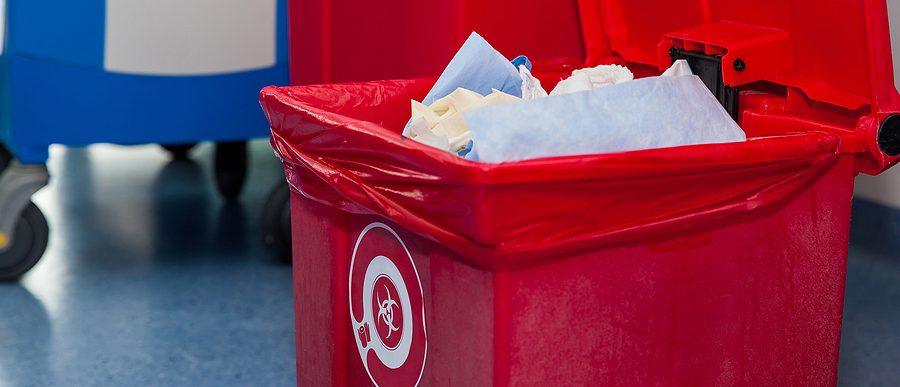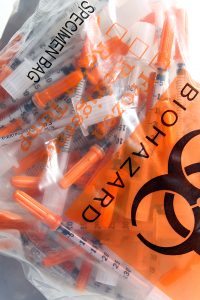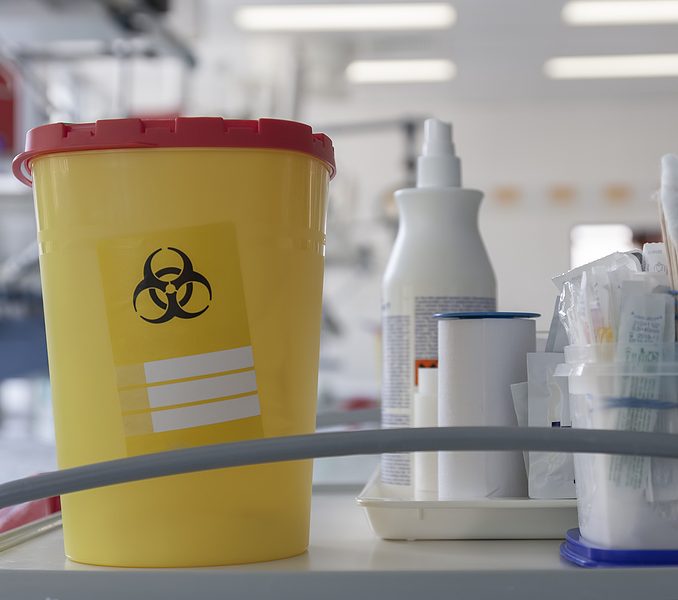Medical Waste Management and Disposal Plan

In the dynamic landscape of healthcare, the safe and responsible management of medical waste is paramount. From hospitals and clinics to laboratories and dental practices, businesses across the healthcare industry generate an array of medical waste that must be handled with care. Navigating the complexities of medical waste management can be challenging for organizations. Stringent regulations, potential health hazards, and environmental concerns need to be considered when creating a plan.
Developing a comprehensive medical waste management and disposal plan is not just a best practice – it’s a critical component of responsible healthcare operations. Medical Waste Pros can help you understand the essential elements of creating a robust medical waste management plan tailored to the needs of your business. Our compliant partners can provide actionable insights to help healthcare businesses safeguard their communities, comply with regulations, and promote sustainable practices in medical waste management. Let’s dive in and discover how to develop a plan that prioritizes safety, compliance, and environmental stewardship in medical waste management.
Understanding Medical Waste
Medical waste encompasses a broad range of materials generated by healthcare facilities and businesses that pose potential risks to public health, safety, and the environment. It includes various types of waste resulting from medical diagnosis, treatment, and research activities. Common types of medical waste include:
- Infectious Waste: Includes materials contaminated with pathogens such as bacteria, viruses, and fungi. Examples- used bandages, swabs, gloves, and cultures.
- Sharps Waste: Comprises needles, syringes, scalpels, and other sharp objects that can cause puncture wounds or cuts. Improper disposal of sharps can lead to needlestick injuries and the transmission of bloodborne pathogens.
- Hazardous Chemical Waste: Chemicals used in healthcare procedures, such as disinfectants, solvents, and laboratory reagents, fall into this category. Improper handling or disposal of hazardous chemicals can pose health risks and environmental hazards.
- Pharmaceutical Waste: Expired or unused medications, chemotherapy drugs, and other pharmaceutical products. Improper disposal of pharmaceuticals can lead to water contamination and adverse effects on aquatic ecosystems.
- Radioactive Waste: Facilities using radioactive materials for diagnostic or therapeutic purposes generate radioactive waste. Proper containment and disposal of radioactive waste are essential to prevent radiation exposure and environmental contamination.

Why Proper Disposal?
The improper handling, storage, and/or disposal of medical waste can be harmful to the community and the environment. Ignoring compliant disposal increases risk of infection, contamination, and occupational injuries. Direct contact or exposure to contaminated surfaces can expose individuals to infectious diseases via pathogens. If not disposed of properly, waste can leach into the water and soil, polluting the environment. Healthcare and sanitation workers that are involved in the collection and handling of waste can also be exposed to needlestick injuries, cuts, and exposure to hazardous chemicals or infectious materials of items that are not properly disposed of.
To prevent these potentially negative outcomes, disposal, storage, handling, and transportation of medical waste is regulated by local, state, and federal bodies. Compliance with these regulations is mandatory for businesses across the US and Canada.
Assessing Medical Waste Generation
Before implementing a medical waste management plan, it’s essential for businesses and healthcare facilities to conduct a comprehensive assessment of their waste generation. This process involves identifying sources of medical waste, quantifying the volume and types of waste generated, and assessing the potential risks and environmental impact.
Identify Sources of Medical Waste
Begin by identifying areas in your organization that may generate medical waste. There may be areas that generate specific types of waste–such as patient care areas versus laboratory areas.
Quantify Waste Generated
Once sources of medical waste have been identified, quantify the volume and types of waste generated by each source. Consider factors such as frequency of generation (daily, weekly, or intermittently), types of waste (infectious, sharps, hazardous, etc), and volume (by weight, container size, etc). These help determine the scale of waste generation and potential cost.
Assess Risk
Once a full picture of waste generation and material types has been generated you are able to assess areas of concern and risks associated with your organization’s processes. This proactive approach lays the foundation for the development of an effective medical waste management plan that promotes safety, compliance, and sustainability. In this step, it is critical to assess both the health risks associated with waste handling as well as the extent to which your facility is complying with laws.

Developing a Medical Waste Management Plan
Once a thorough assessment of medical waste generation has been conducted, businesses and healthcare facilities can develop a comprehensive medical waste management plan tailored to their specific needs. Medical Waste Pros can assist you in getting matched with a disposal company that assists you in creating a plan. Our team can also answer any questions you may have about the disposal process, necessary services, and more! The key components of a medical waste management and disposal plan are:
Segregation and Containment
Segregation of different types of medical waste at the point of generation minimizes contamination and facilitates proper disposal. Train employees on the proper segregation of medical waste according to its type and characteristics. This can include using color-coded bins, labels, and signage. Select appropriate containers for the safe containment of medical waste, ensuring they are leak-proof, puncture-resistant, and properly labeled.
Storage and Handling
Establish protocols for safely storing and handling medical waste on-site to prevent exposure and environmental contamination. Designating a secure, well-ventilated storage area for waste can be an important aspect of this step. Additionally, staff will need to be trained on safe handling practices such as wearing personal protective equipment.
Transportation and Transfer
Medical Waste Pros can match you with a disposal provider that can handles the safe transportation of waste to facilities. Come up with a plan alongside your provider that outlines how often waste pick up needs to occur.
Training and Education
Provide comprehensive training and education programs for employees to ensure they understand their roles and responsibilities in medical waste management. Not only will new staff need to be trained, but ongoing education will need to be provided to keep up with changes in regulations and best practices.
Solutions with Medical Waste Pros
Taking on the creation of a comprehensive medical waste management and disposal plan on one’s own can be complicated. However, it is a mandatory task for responsible facilities. Medical Waste Pros can match you with a disposal and management service that assists you with developing a step-by-step plan for your business or healthcare facility. Our network of providers are local, trusted, and fully compliant with relevant regulations. To get matched today, fill out the form or give us a call (888) 755-6370.










